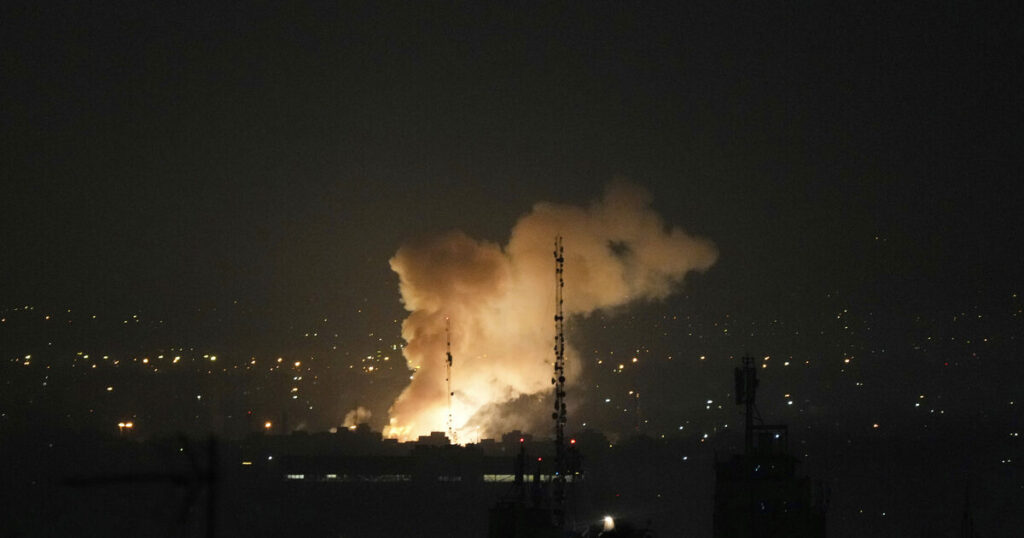Early Friday morning, Israel launched strikes against Iran’s capital, Tehran, targeting the nation’s nuclear program and escalating tensions between the two adversaries, raising concerns of a full-scale war.
The attack appears to be the most significant Iran has endured since the Iran-Iraq War in the 1980s, with reports of multiple sites across the country being hit.
Iranian state television reported the death of a leader from Iran’s paramilitary Revolutionary Guard. Reports also indicate that another high-ranking Guard official, along with two nuclear scientists, are feared dead.
Israeli officials justified the attack as a preemptive measure to neutralize what they claimed was an imminent threat of Iran developing nuclear weapons. They also warned of potential retaliation targeting civilians within Israel.
𝐓𝐡𝐞 𝐈𝐃𝐅 𝐥𝐚𝐮𝐧𝐜𝐡𝐞𝐝 𝐚 𝐩𝐫𝐞𝐞𝐦𝐩𝐭𝐢𝐯𝐞, 𝐩𝐫𝐞𝐜𝐢𝐬𝐞, 𝐜𝐨𝐦𝐛𝐢𝐧𝐞𝐝 𝐨𝐟𝐟𝐞𝐧𝐬𝐢𝐯𝐞 𝐭𝐨 𝐬𝐭𝐫𝐢𝐤𝐞 𝐈𝐫𝐚𝐧’𝐬 𝐧𝐮𝐜𝐥𝐞𝐚𝐫 𝐩𝐫𝐨𝐠𝐫𝐚𝐦.
Dozens of IAF jets completed the first stage that included strikes on dozens of military targets, including… pic.twitter.com/vtx98P9564
— Israel Defense Forces (@IDF) June 13, 2025
Supreme Leader Ayatollah Ali Khamenei has vowed “severe punishment” against Israel in response to the attack.
In a statement released by the state-run IRNA news agency, Khamenei accused Israel of “opening its wicked and blood-stained hand to a crime in our beloved country, revealing its malicious nature more than ever by striking residential centres.”
The Trump administration in Washington stated they were not involved in the attack. They had previously cautioned Israel against such action amid ongoing negotiations and warned Iran against retaliating against US interests or personnel.
Israeli Prime Minister Benjamin Netanyahu stated that the strikes targeted both nuclear and military sites within Tehran. He added that officials in charge of Iran’s nuclear program and ballistic missile arsenal were also targeted.
The assault follows repeated warnings from Israel that it will not allow Tehran to acquire nuclear weapons, although the extent of Iran’s progress towards that goal remains unascertained.
Netanyahu, in a YouTube address, said the attacks would continue “for as many days as it takes to remove this threat.”
“It could be a year. It could be within a few months,” he stated, pledging to maintain the offensive until the perceived threat is eliminated.
“This is a clear and present danger to Israel’s very survival.”
The International Atomic Energy Agency (IAEA) confirmed that an Israeli strike hit Iran’s uranium enrichment facility at Natanz and stated they are closely monitoring radiation levels.
The attack comes after escalating tensions that prompted the US to withdraw some diplomats from Iraq and authorize voluntary evacuations for the families of US troops stationed in the broader Middle East.
US Secretary of State Marco Rubio acknowledged that Israel took “unilateral action against Iran” and that Israel informed the US that the strikes were deemed necessary for its self-defense.
“We are not involved in strikes against Iran, and our top priority is protecting American forces in the region,” Rubio stated in a White House statement, cautioning Iran against targeting US assets or personnel.
The attack exacerbates existing tensions surrounding Tehran’s rapidly developing nuclear program.
The International Atomic Energy Agency’s board of governors censured Iran on Thursday, the first such action in 20 years, for its lack of cooperation with inspectors.
In response, Iran announced plans to establish a third enrichment site and replace some centrifuges with more advanced models.
Israeli Defence Minister Israel Katz took responsibility for the attack, without detailing specific targets.
“In the wake of the state of Israel’s preventive attack against Iran, missile and drone attacks against Israel and its civilian population are expected immediately,” he said in a statement.
The statement also noted that Mr. Katz has “signed a special order declaring an emergency situation in the home front.”
“It is essential to listen to instructions from the home front command and authorities to stay in protected areas,” it continued.
Both Iran and Israel have closed their airspace.


